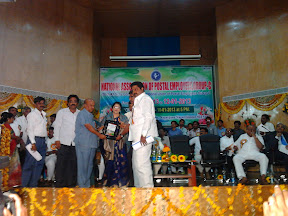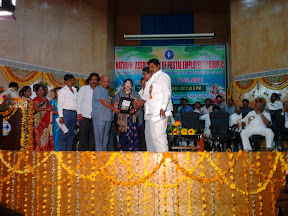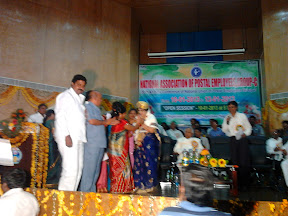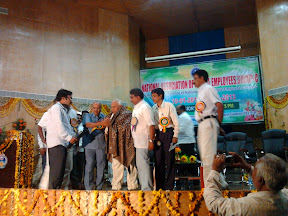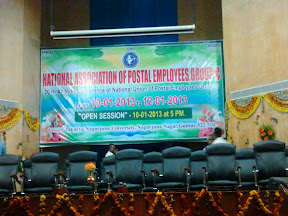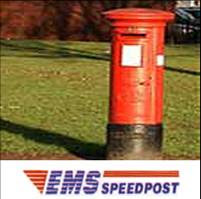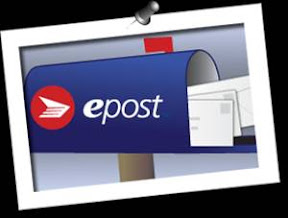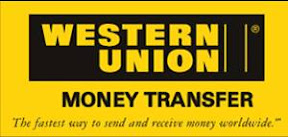Details/Pattern of Postal/Sorting Assistant (PA/SA) Phase-II Exam 2013 (Computer/Typing Test)
Results of Andhra Pradesh, Gujarat, Karnataka, Maharashtra, Tamil Nadu, Assam, Chhattisgarh, Jharkhand, Madhya Pradesh, North East, Odisha, West Bengal and Kerala Postal Circles already stands published in the official website.
Results of Delhi, Jammu & Kashmir, Punjab, Uttar Pradesh, Uttrakhand, Bihar, Haryana, Himanchal Pradesh and Rajasthan Circles are expected soon.
Here is the list of number of candidates shortlisted from each Circle based on the results declared so far.
Name of Circle
|
No. of Shortlisted Candidates for Paper-II
|
Andhra Pradesh
|
2115
|
Gujarat
|
983
|
Karnataka
|
612
|
Maharashtra
|
1947
|
Tamil Nadu
|
1783
|
Assam
|
2114
|
Chhattisgarh
|
330
|
Jharkhand
|
640
|
Madhya Pradesh
|
1097
|
North East
|
153
|
Odisha
|
749
|
West Bengal
|
2023
|
Kerala
|
1000
|
Pattern of Paper-II (Computer / Typing Test):
The Typing Test shall be for a duration of 30 minutes (15 minutes each for Typewriting and data entry) consisting of one passage of 450 words in English or 375 words in Hindi to be typed with a minimum speed of 30/25 words per minute respectively & Data entry of some figures and letters each carrying equal marks on Computers.
The typing test and test of data entry operations will be conducted on Computer key board but not on type writer.
Note: The final merit shall be prepared on the basis of the aggregate marks obtained by the Applicants in the Aptitude Test (Paper I) only subject to their qualifying in Computer/Typing test ( Paper II). ie, there will be no marks for Typing/Data entry test. You have to just qualify the minimum criteria in Paper-2 and final merit list shall be prepared on the basis of marks of Paper-I only.
Probation period of PA/SA
Directorate vide memo No. 60-3/2013-SPB-I dated 8/7/2013 has clarified that ás per revised Recruitment Rules for the post of Postal Assistant / Sorting Assitant notified on 3rd November 2011, the period of probation is the same i.e. two years but the provision of Examination for confirmation has been discontinued and clearance of probation period is to be decided by the Departmental Promotion Committee (DPC). It is also clarified that who have not yet cleared the confirmation test may not be subjected to confirmation examination but may be assessed for clearing their probation after taking into consideration their performance during the induction training, the special report /ACRs and any other relevant input. If they are not found up to the mark, their probation period may be extended as per the Government's instructions. In such cases, PAs/SAs shall be considered for clearance of probation period from a prospective date and not with retrospective effect.
Directorate vide memo No. 60-3/2013-SPB-I dated 8/7/2013 has clarified that ás per revised Recruitment Rules for the post of Postal Assistant / Sorting Assitant notified on 3rd November 2011, the period of probation is the same i.e. two years but the provision of Examination for confirmation has been discontinued and clearance of probation period is to be decided by the Departmental Promotion Committee (DPC). It is also clarified that who have not yet cleared the confirmation test may not be subjected to confirmation examination but may be assessed for clearing their probation after taking into consideration their performance during the induction training, the special report /ACRs and any other relevant input. If they are not found up to the mark, their probation period may be extended as per the Government's instructions. In such cases, PAs/SAs shall be considered for clearance of probation period from a prospective date and not with retrospective effect.
C. G. Employees and their dependents can avail treatment in a non empanelled Private hospitals in emergency conditions and get reimbursement
(G.I MH OM No. F. No. S. 14025/14/2012-MS, dated 11.06.2013)
6. This issue with the concurrence of the Integrated Finance Division vide their Dy. No. C-282, dated 22.05.2013.
Revision of rates for reimbursement of medical expenses incurred in emergency conditions under CS (MA) Rules, 1944
The undersigned is directed to state that the issue of revision of rates for reimbursement of medical expenses incurred on availing medical treatment in emergency conditions under CS (MA) Rules, 1944, when treatment is taken in a non-empanelled private hospital, has been under consideration of the Government for some time.
2. It has now been decided that, reimbursement of medical expenses incurred by a Central Government employee covered under CS(MA) Rules, 1944 on availing medical treatment for himself and his dependent family members in emergency conditions, would be allowed as per the prevailing non –NABH CGHS rates as applicable to a CGHS covered city and non-NABH rates applicable to the nearest CGHS covered city in case of non-CGHS city, as the case may be, or the actuals, whichever is less.
3. For the medical treatment in such cases where package rates are prescribed under CGHS, the non-NABH rates of the CGHS covered city and non-NABH rates of the nearest CGHS city (in case of non-CGHS covered city) or the actuals, whichever is less, will be applicable.
4. This OM supersedes all earlier orders issued from time to time under CS (MA) Rules, 1944 on this subject for allowing reimbursement of medical expenses in emergency conditions when treatment is taken in a non-empanelled private hospital.
5. This OM will come into effect from the date of issue.
FRIDAY, JULY 26, 2013
EXEMPTION FROM FILING ITR (INCOME TAX RETURN) NOT EXTENDED THIS ASSESSMENT YEAR 2013-14 – CBDT
Income Tax Department issues press release to clarify that unlike previous year Salaried Employees with Total Income up to Rs.5 lakhs too have to file ITR (Income Tax Return) this year viz., Assessment year 2013-14.
The full text of Press Release issued by CBDT (Cenral Board of Direct Tax) is as follows:
The CBDT has, vide notification dated 1-05-2013, made E-filing of Return compulsory for Assessment Year 2013-14 for persons having total assessable income exceeding Five lakh rupees.
The CBDT vide its earlier notifications had exempted salaried employees having total income up to Rs. 5 lakhs including income from other sources up to Rs. 10,000/- from the requirement of filing return of income for assessment year 2011-12 and 2012-13 respectively. The exemption was available only for the assessment year 2011-12 and 2012-13. The exemption was giving considering ‘paper filing of returns’ and their ‘processing through manual entry’ on system.
However, this year the facility for online filing of returns has been made user-friendly with the advantage of pre-filled return forms. These E-filed forms also get electronically processed at the central processing centre in a speedy manner. Hence, the exemption provided during the last two years is not being extended for assessment year 2013-14. Taxpayers are encouraged to file their returns electronically. E-filing is an easy, fast and secure method of filing of income tax return. Moreover, Digital signature is not mandatory for these taxpayers and they can transmit the data in the return electronically by downloading ITRs, or by online filing and thereafter submit the verification of the return in From ITR-V acknowledgement after signature to Central Processing Centre.
The processing for E-filed returns is faster. From 25th July to 31st July 2013 (Except 27th and 28th July being holidays), Special Return Receipt Counters are opened in IT Offices (FOR SALARIED TAX PAYERS)
WEDNESDAY, JULY 24, 2013
DG Post No. 137-41/2003-SPB-II dated 8-7-2004
Sub: Trade Union facilities – Immunity from transfer and Grant of Special Casual Leave
In the first ordinary meeting of the Departmental Council (JCM), Department of Posts held on 18-11-2003, the Secretary, Staff Side, Departmental Council (JCM) had taken up two items relating to Trade Union Facilities viz, Immunity from transfer and Grant of Special Casual Leave as item Nos. 6(a) and 6(b) respectively.
2. With regard to item 6(a) in the Departmental Council Meeting, the Official Side stated that this would be examined. According to the existing instructions, concession of immunity from transfer from the headquarters of recognized Service Association is applicable to their office bearers during 1st year of their elections to the office of Chief Executive or General Secretary, Assistant Secretary and Financial Secretary or Treasurer of Group C and Group D Association whether they are All India, Circle or Divisional units, if the constitution and bye laws of the Central Service Association permit opening of such branches. If there are several office bearers with same designation, the concession applies during the first year of the office to only one of each category i.e. Chief Executive or General Secretary, Assistant Secretary and Financial Secretary (or Treasurer) as may be nominated by the Service Associations. In view of the change in periodicity of the election, it has now been decided that with mutual good will between the Service Association and the local office and subject to administrative e requirement, the office bearers elected to the above said offices of the Service Association may stay at the headquarters station for two years.
3. In so far as the item No. 6(b) relating to grant of special casual leave is concerned, the instructions issued in letter No. 54-13/71-SPB-II dated 31-1-74 are relevant. As indicated therein, as for as possible the Divisional Executive Committee meetings of the Service Association will be held on holidays or outside office hours. The number of Members attending to the Committee meetings is to be in accordance with the Constitution. These instructions further envisage where there is reason to believe that more members are asking for special casual leave than is justified, the Constitution and the records of the Service Associations may be checked up to find out whether facilities have been asked for more Members than is admissible under the rules. In the DC meeting held on 18-11-03, the Staff Side stated that the provisions in these orders are being misinterpreted to the extent tht in certain Circles, the Unions are being asked to hold meetings only on holidays or outside office hours. The Staff Side also stated that the number of officials to be granted special casual leave is also being decided arbitrarily. It was explained by the Official Side that the existence of the Department depended upon better customer service and in pursuance thereof the Staff Side must extend its cooperation and try to hold meeting on holidays or outside office hours. In view of this position, it is reiterated that while considering the question for grant of special casual leave to the office bearers of the Service Associations, the spirit of the instructions contained in the letter dated 31-1-74 is to be kept in mind.
Sd/-
(R Srinivasan)
Assistant Director General (SPN)
FRIDAY, JULY 19, 2013
DG No. 01-14/2009-RB dated 03-07-2013
Sub: Revised incentive Structure to post office staff involved in MGNREGS related work – regarding
This is regarding the revised incentive structure payable to post office staff involved in MGNREGS related work. In this connection it is intimated that the incentive structure was issued to Circles vide RB division’s letter of even no. dated 18-01-2010.
2. For MGNREGS transactions incentive to post office staff will be paid for the following three activities of MGNREGS work; The details of which are as follows:-
3. The following rates of incentive have been approved for post office staff performing MGNREGS work;
(i) Incentive for opening new MGNREGS account:
(a) At the rate of Rs 0.50 per new account payable to GDS BPM
(b) At the rate of Rs 0.40 per new account to PA in SO/HO and Rs 0.10 per new account to supervisor in SO/HO.
(c) At the rate of Rs 0.30 per new account to Léger assistant and Rs 0.10 per new account to ledger supervisor in the account office.
(ii) Incentive at BO/SO level making MGNREGS payments: No threshold limit is fixed for payment of incentive under MGNREGS. Incentive will be paid on each and every transaction.
Sl No.
|
Office
|
Designation
|
Rate of Incentive
|
1
|
EDBO
|
GDS BPM
|
Rs 1.50 per MGNREGS payment
|
Other GDS(if available and performing MGNREGS work)
|
Rs 0.20 per MGNREGS payment
| ||
2
|
SOs/HOs
|
Office doing operative work of MGNREGS
|
Rs 1.30 per MGNREGS payment
|
Official supervising operative work of MGNREGS, if any
|
Rs 0.20 per MGNREGS payment
| ||
Group D/packer/GDS packer (performing MGNREGS work
|
Rs 0.20 per MGNREGS payment
|
(iii)`Incentive at back office level for making ledger entries :
Sl No.
|
Office
|
Designation
|
Rate of Incentive
|
1
|
SO
|
Ledger PA
|
Rs 0.10 per MGNREGS deposit
|
Rs 0.10 per MGNREGS withdrawal
| |||
Supervisor
|
Rs 0.05 per MGNREGS deposit
| ||
Rs 0.0 5per MGNREGS withdrawal
| |||
2
|
HO
|
Ledger PA
|
Rs 0.10 per MGNREGS deposit
|
Rs 0.10 per MGNREGS withdrawal
| |||
Supervisor
|
Rs 0.05 per MGNREGS deposit
| ||
Rs 0.05 per MGNREGS withdrawal
|
The incentive would be paid only when it is ensured that all the ledger entries are completed in respect of MGNREGS accounts.
4. Ceiling on payment of incentive: With regard to monthly ceiling of incentive to be paid to GDS employee, it has been decided that monthly ceiling for payment of incentive will be the upper limit of TRCA+DA paid to GDS to maintain uniformity. In respect of Departmental officials working in Sub-Office and Head Post Offices, the existing Dept. of Personnel & Trg. / Govt of India/Departmental instructions on the payment of incentive and annual ceiling would apply.
5. Operational Procedure for making incentive payment:
In order to make the operational p[procedure for claiming of MGNREGS incentive simple, it has been approved that the responsibility for payment of incentive to Gramin Dak Sevak will be vested with SPMs (of account SO) and in respect of officials of SOs to Head Post Masters (of account HO) Incentive will be claimed on monthly basis along with a voucher on the dates of occurrence of MGNREGS accounts. In order to restrict the incentive to the TRCA, an incentive register will be maintained at Sub Office level and HO level. Detailed operational procedure for claiming incentive for MGNREGS payments at BO level and to back office operations is being outlined as under:
i) The Muster Roll along with names of the beneficiaries is received in the BO from the State Government and BPM has to effect payment of withdrawals to the beneficiaries. The BPM has to maintain separate SB journal for MGNREGS payments and should send a list of MGNREGS payments effected on a particular day to the Account Office along with the copy of the Muster Roll and Withdrawal Forms (passed warrants) indicating the amount. The BPM will prepares a voucher for claiming the incentive for the MGNREGS transactions for himself and the other Gramin Dak Sevaks in the BO on monthly basis to the Account Office. The Account Office in turn will verify the payments with reference to BNO Daily Accounts and separate journal maintained at SO/HO levels and authorize the payment of incentive and return the voucher to the BO duly authorizing payment. Money paid voucher (ACG-17) will be used for this purpose. On payment, the voucher will be sent to HO by charging the expenditure under bills paid. The HO will account the vouchers after due classification under the relevant Head of Account.
ii) SPMs will maintain a Register, like to the Register of commission paid to BPMs in respect of SB/TD and Savings Certificate indicating the payment of incentive to the GDS BO-wise and GDS name-wise for applying ceiling criteria and will ensure that the incentive does not exceed the upper limit of TRCA+DA payable to each GDS in a month.
iii) In respect of MGNREGS payments taking place at the Sub/office, the SPM will prepares a voucher for payment of incentive for transactions occurring at his SO only and submit the voucher to the HO for checking and authorizing the payment. Here also, the same procedure outlined above will be adopted. Head Post Office will maintain a regi9ster for payment of incentive to ensure that payment of incentive to particular departmental officials (including Gr. D) and GDS official does not exceed the prescribed ceiling.
iv) The SPMs will be responsible for monthly payment of incentive for the BOs and the Head Postmasters will be responsible for the i9ncentive payment in respect of the Sub-Office. The SPM should obtain incentive vouchers subsequently from BPMs, who failed to send it along with BO daily Account.
v) Procedure for payment of incentive for back office operations – Incentive will be paid at back office level for making ledger entries. The incentive for the Sub-offices for NREGS transactions will be authorized by the Head Post Master (HPM) after due verification with reference to records. In respect of back office work at HPO, the APM SB or Dy PM SB in charge of SB Branch l have to prepare a incentive claim and send to the Divisional Office with due certification of Head Post Master (HPM) on the aspect of completion of ledger posting. The Divisional Office will authorize incentive payment for back office level transactions at HO subject to the annual ceiling. It will also watch expenditure on incentive in Divisions, so that it remains within the availability of fund.
6 This letter issued with the concurrence of JS&FA(P) and approval of Secretary
(Posts).
(KK Devis)
Assistant Director General (RB)
Central Sector Scholarship Scheme of ‘Top Class Education’ for Scheduled Tribe students
The Union Cabinet today gave its approval to increase the total family income ceiling under the central sector scholarship scheme of “Top Class Education” for Scheduled Tribe (ST) students” from the existing Rs. 2 lakh to Rs. 4.50 lakh per annum, with effect from the selection year 2013-14.
The enhancement of the ceiling of the annual total family income from all sources will enable larger number of ST students avail benefits of the scheme. This will also act as a major incentive for ST students pursuing higher and technical education.
The decision does not entail any additional burden. The expenditure on account of revision of the scheme would be met under the existing budget allocation for each year.
Background :
The Central Sector scholarship scheme of “Top Class Education” for ST students’ was approved by the Cabinet in its meeting held in May 2007 and came into force with effect from 2007-08. The objective of the scheme is to provide adequate financial support to ST students for pursuing professional education in selected premier institutions of the country.
Subscribe to: Posts (Atom)
FILES (CLICK THE BELOW LINK)
FOLLOW NAPE G-C BY EMAIL (PLEASE PROVIDE YOUR MAIL ID IN BELOW TEXT BOX AND CLICK SUBMIT)
AFFILIATED UNIONS
TOTAL VISITORS TILL NOW
357191




